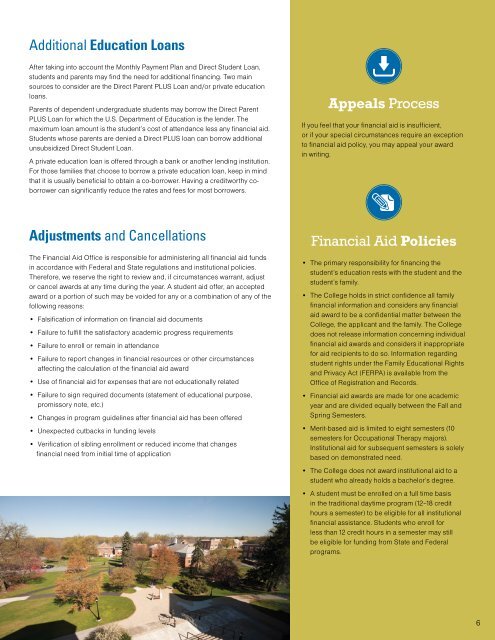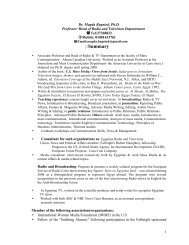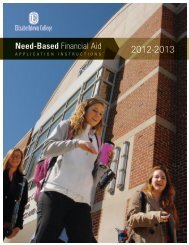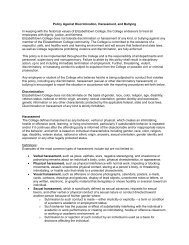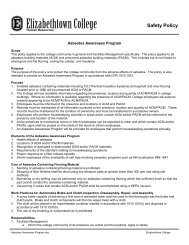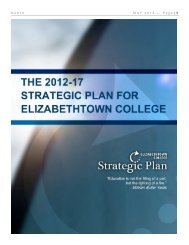Financial Aid Handbook - Elizabethtown College
Financial Aid Handbook - Elizabethtown College
Financial Aid Handbook - Elizabethtown College
Create successful ePaper yourself
Turn your PDF publications into a flip-book with our unique Google optimized e-Paper software.
Additional Education Loans<br />
After taking into account the Monthly Payment Plan and Direct Student Loan,<br />
students and parents may find the need for additional financing. Two main<br />
sources to consider are the Direct Parent PLUS Loan and/or private education<br />
loans.<br />
Parents of dependent undergraduate students may borrow the Direct Parent<br />
PLUS Loan for which the U.S. Department of Education is the lender. The<br />
maximum loan amount is the student’s cost of attendance less any financial aid.<br />
Students whose parents are denied a Direct PLUS loan can borrow additional<br />
unsubsidized Direct Student Loan.<br />
A private education loan is offered through a bank or another lending institution.<br />
For those families that choose to borrow a private education loan, keep in mind<br />
that it is usually beneficial to obtain a co-borrower. Having a creditworthy coborrower<br />
can significantly reduce the rates and fees for most borrowers.<br />
Appeals Process<br />
If you feel that your financial aid is insufficient,<br />
or if your special circumstances require an exception<br />
to financial aid policy, you may appeal your award<br />
in writing.<br />
Adjustments and Cancellations<br />
The <strong>Financial</strong> <strong>Aid</strong> Office is responsible for administering all financial aid funds<br />
in accordance with Federal and State regulations and institutional policies.<br />
Therefore, we reserve the right to review and, if circumstances warrant, adjust<br />
or cancel awards at any time during the year. A student aid offer, an accepted<br />
award or a portion of such may be voided for any or a combination of any of the<br />
following reasons:<br />
• Falsification of information on financial aid documents<br />
• Failure to fulfill the satisfactory academic progress requirements<br />
• Failure to enroll or remain in attendance<br />
• Failure to report changes in financial resources or other circumstances<br />
affecting the calculation of the financial aid award<br />
• Use of financial aid for expenses that are not educationally related<br />
• Failure to sign required documents (statement of educational purpose,<br />
promissory note, etc.)<br />
• Changes in program guidelines after financial aid has been offered<br />
• Unexpected cutbacks in funding levels<br />
• Verification of sibling enrollment or reduced income that changes<br />
financial need from initial time of application<br />
<strong>Financial</strong> <strong>Aid</strong> Policies<br />
• The primary responsibility for financing the<br />
student’s education rests with the student and the<br />
student’s family.<br />
• The <strong>College</strong> holds in strict confidence all family<br />
financial information and considers any financial<br />
aid award to be a confidential matter between the<br />
<strong>College</strong>, the applicant and the family. The <strong>College</strong><br />
does not release information concerning individual<br />
financial aid awards and considers it inappropriate<br />
for aid recipients to do so. Information regarding<br />
student rights under the Family Educational Rights<br />
and Privacy Act (FERPA) is available from the<br />
Office of Registration and Records.<br />
• <strong>Financial</strong> aid awards are made for one academic<br />
year and are divided equally between the Fall and<br />
Spring Semesters.<br />
• Merit-based aid is limited to eight semesters (10<br />
semesters for Occupational Therapy majors).<br />
Institutional aid for subsequent semesters is solely<br />
based on demonstrated need.<br />
• The <strong>College</strong> does not award institutional aid to a<br />
student who already holds a bachelor’s degree.<br />
• A student must be enrolled on a full time basis<br />
in the traditional daytime program (12–18 credit<br />
hours a semester) to be eligible for all institutional<br />
financial assistance. Students who enroll for<br />
less than 12 credit hours in a semester may still<br />
be eligible for funding from State and Federal<br />
programs.<br />
6


